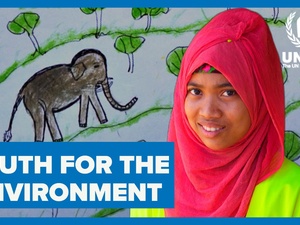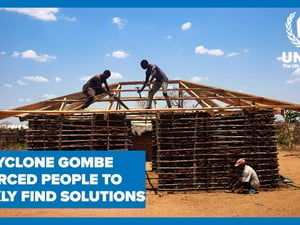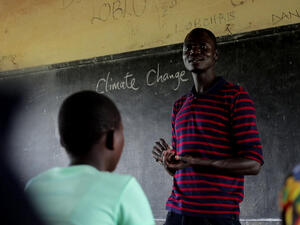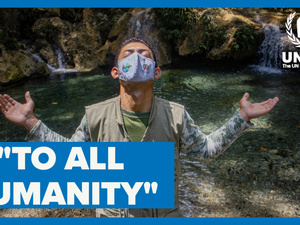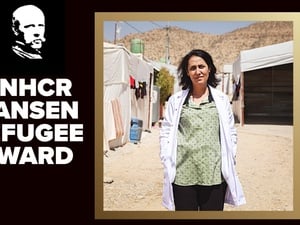Thousands of Iraqis benefit from UNHCR clean-up campaign in Baghdad
Thousands of Iraqis benefit from UNHCR clean-up campaign in Baghdad

Workers cleared piles of rubbish in the Chikook neighbourhood with the help of a tractor and trailer.
BAGHDAD, Iraq, April 29 (UNHCR) - When a wave of sectarian violence swept through Baghdad in 2006, some 12,000 people fled their homes in the west of the city and found refuge in six sprawling compounds in the Chikook suburb.
When a senior UNHCR official visited the settlement earlier this year, he was appalled at the conditions that the displaced Iraqis and some 9,000 locals were living in. Garbage and swamps of sewage covered the area, recalled Radhouane Nouicer, head of UNHCR's Middle East and North Africa Bureau. He said the mess posed a major health hazard.
Um Kasem, a widower who fled to Chikook with her children three years ago, agreed. "The situation in Chikook is very bad, with a lack of cleaning services and an aggressive smell everywhere."
But she was talking before UNHCR launched a clean-up campaign. The first phase of the operation, overseen by two national staff members, began on April 20 and ended last Sunday. A cleaning company hired by UNHCR used tractors, carts and spade-wielding labourers to remove the mountains of garbage, and pumps and pipes to clear the sewage. The refuse was later incinerated.
Under the second phase of the project, which began this week, a local non-governmental organization funded by UNHCR will conduct regular clean-ups with the help of the local community. The NGO has also started awareness classes in a primary school, stressing to children the importance of hygiene and safe waste disposal.
The inhabitants of Chikook, the internally displaced and locals alike, have welcomed the development. "We thank UNHCR for coming to this area and for its efforts in helping us solve the problem of removing rubbish," said Kamal, who also moved to Chikook in 2006.
Nouicer said there was a great need for services such as waste removal and disposal. "There are many such settlements [for displaced people] in Iraq and much more could be done [to keep them clean], but shortage of funding remains a major handicap."
Daniel Endres, UNHCR's representative in Iraq, added that although the agency's priority in 2009 was on reintegrating returnees, "We cannot close our eyes to such extremely vulnerable internally displaced Iraqis and the community hosting them."
For some of the internally displaced, return to their homes will not be possible and local integration is the only durable solution. Since April last year, UNHCR has provided emergency shelter rehabilitation and shelter upgrade to 4,145 families.
UNHCR estimates that 1.6 million Iraqis were internally displaced by the sectarian warfare that erupted in February 2006 after the golden dome of the Al Askari Mosque was blown up in the ancient city of Samarra. Almost 200,000 internally displaced people have returned to their homes amid a general improvement in the security situation since mid-2008.
By Maha Sidky in Baghdad, Iraq



